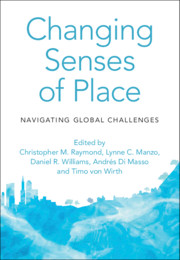Book contents
- Changing Senses of Place
- Changing Senses of Place
- Copyright page
- Dedication
- Contents
- Contributors
- Foreword
- Preface
- Acknowledgements
- Introduction
- Part I Climate Change and Ecological Regime Shifts
- Part II Migration, Mobility and Belonging
- Part III Renewable Energy Transitions
- Part IV Nationalism and Competing Territorial Claims
- 13 Ethnocentric Bias in Perceptions of Place
- 14 Sense of Place Between Spatial Justice and Urban Violence in Palestine
- 15 The Political Ecology of Place Meaning
- Part V Urban Change
- Part VI Technological and Legal Transformations
- Part VII Design and Planning Strategies for Changing Senses of Place
- Part VIII Conclusion
- Index
- References
13 - Ethnocentric Bias in Perceptions of Place
The Role of Essentialism and the Perceived Continuity of Places
from Part IV - Nationalism and Competing Territorial Claims
Published online by Cambridge University Press: 15 July 2021
- Changing Senses of Place
- Changing Senses of Place
- Copyright page
- Dedication
- Contents
- Contributors
- Foreword
- Preface
- Acknowledgements
- Introduction
- Part I Climate Change and Ecological Regime Shifts
- Part II Migration, Mobility and Belonging
- Part III Renewable Energy Transitions
- Part IV Nationalism and Competing Territorial Claims
- 13 Ethnocentric Bias in Perceptions of Place
- 14 Sense of Place Between Spatial Justice and Urban Violence in Palestine
- 15 The Political Ecology of Place Meaning
- Part V Urban Change
- Part VI Technological and Legal Transformations
- Part VII Design and Planning Strategies for Changing Senses of Place
- Part VIII Conclusion
- Index
- References
Summary
The rising wave of nationalism and xenophobia in the world triggers interest in processes underlying ethnocentric tendencies in humans. In this chapter we focus on the issue of ethnocentrism in perception of places and describe processes that facilitate the ethnocentric closure to the presence of the ‘other’ in the city space. We present data that demonstrate that one of the factors responsible for this ethnocentric closure is type of the perceived continuity of a place: essentialist vs anti-essentialist. We show, on the basis of studies carried out in cities of Poland, Ukraine and Lithuania, that perception of places in terms of essentialist continuity facilitates place identity but is also a powerful trigger of the ethnocentric bias in perception of the places’ multicultural past and present. In contrast, interpretation of the place continuity as a chain of interconnected events (anti-essentialist continuity) helps to accept the ethnic and social diversity of places.
- Type
- Chapter
- Information
- Changing Senses of PlaceNavigating Global Challenges, pp. 171 - 181Publisher: Cambridge University PressPrint publication year: 2021
References
- 2
- Cited by

